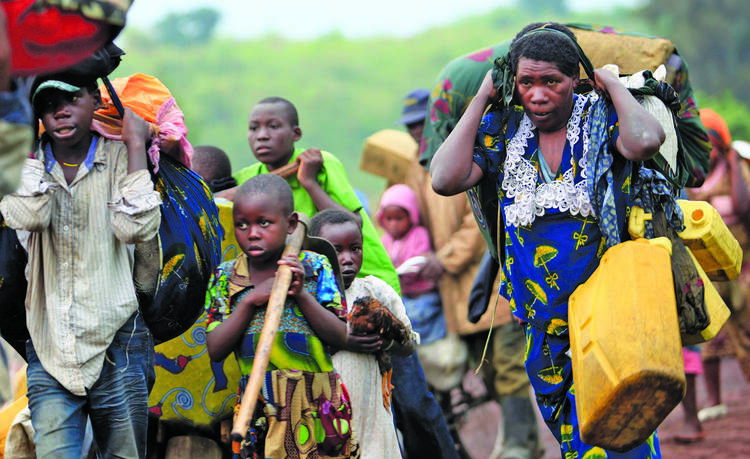For nearly two decades the people of the Democratic Republic of Congo, especially those in its eastern North Kivu Province, have known nothing but conflict and dislocation. “Imagine that since 15 years the people are constantly displaced,” said Bishop Nicolas Djomo Lola, president of the Congo’s bishops’ conference and bishop of the Diocese of Tshumbe. “They are exhausted. That is why,” he said, “the church is asking for peace...asking the international community to push for that, so that we can have finally a lasting peace.”
Bishop Djomo was in New York on April 18 to meet with representatives from the United Nations Security Council to thank them personally for the assistance that the United Nations has so far provided to the D.R. Congo, but also to implore them to make a final effort to bring the central African nation’s various conflicts to a peaceful conclusion. To that end, he was supporting the recent approval of a more aggressive U.N. brigade to North Kivu. The Security Council approved the creation of a so-called intervention brigade, a new combat force to conduct “targeted offensive operations” against armed groups in eastern Congo in March. It will be the first time a U.N. force has received an offensive mandate.
Soldiers from Mozambique, Tanzania and South Africa should be in the field by July as part of the new brigade. The effectiveness of the current U.N. peacekeeping force has long been criticized as the country’s long conflict dragged on. According to Bishop Djomo, the success of this latest U.N. mission to establish peace in Congo is crucial. “We have more than 30 armed groups in the country,” Bishop Djomo said. “We need to put an end to the violence in that region.” The war in Congo, he added, has claimed five million lives. “The church is trying to prevent it from taking a million more.”
Bishop Djomo reports that the church in Congo carries many burdens. It runs 40 percent of the nation’s schools and provides 45 percent of its health care services in addition to running humanitarian and economic development efforts through Caritas Internationalis, the international church’s relief and development agency. The church also contributes to the struggling nation’s peacemaking efforts and civil and human rights capacity building “in order to prepare a new generation of leaders in the Congo.”
Key to achieving that peace, he said, is addressing the “root causes” of the conflict, an international hunger for the large nation’s vast mineral wealth. “The armed groups, with the complicity of some Congolese, but especially with [multinational] companies, are exploiting the minerals illegally. They sell these minerals, get money and commit atrocities against the population, [including] even the rape against the women. It’s a cycle, and we have to put an end to that cycle thanks to the U.N. brigade.”
Bishop Djomo declined to identify the companies involved in the conflict minerals trade. “It’s not politically correct to say which companies are working with the armed groups,” he said with a small laugh. “They are from all over the world—the United States, from Europe, from Asia—so we are calling for an international association to protect the minerals for the Congo and for the region.”
Bishop Djomo says D.R. Congo could best use U.S. assistance for professionalizing its armed forces, frequently the target itself of accusations of sexual violence and human rights violations, so that the central government can assert control throughout the nation.
Listen to Kevin Clarke's interview with Bishop Nicolas Djomo.








